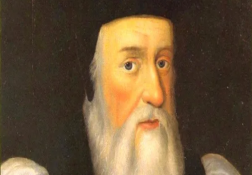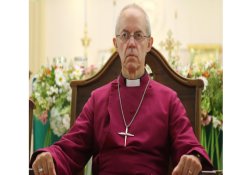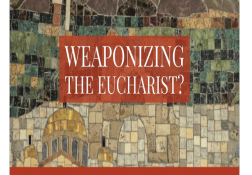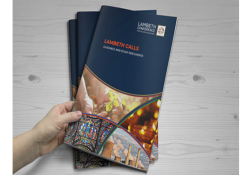You are here
 August 16 2022
Why Study Church History?
August 16 2022
Why Study Church History?
For anyone who studies church history, there can be no doubt that there has been an organic development of doctrine which has grown out of a centuries long reflection upon the nature and meaning of New Testament Christianity. Partially, this has grown out of the age-old question of individual judgment versus corporate judgment. This is not a new question. In church history, we are literally "crowded about with a great multitude of witnesses".
Read more August 12 2022
Right Desire and True Gospel: Necessary or Expedient
August 12 2022
Right Desire and True Gospel: Necessary or Expedient
The heart of Tudor Protestantism was not right doctrine but right desire. Undoubtedly, Cranmer and his fellow English Reformers thought the two were closely connected. Truth about God would draw humanity homeward. Right desire could only be formed by right knowledge of both God and fallen human nature. Nevertheless, saving truth by itself was insufficient to move a self-centered humanity to return to the Creator through repentance and amendment of life.
Read more August 05 2022
THE ARCHBISHOP OF CANTERBURY'S COMMENTS ON HUMAN SEXUALITY -- REFLECTIONS OF A CRITICAL FRIEND
August 05 2022
THE ARCHBISHOP OF CANTERBURY'S COMMENTS ON HUMAN SEXUALITY -- REFLECTIONS OF A CRITICAL FRIEND
For example, at the start of his work The Book of Pastoral Rule, Pope Gregory the Great explains that the work was written in response to a letter from John, Bishop of Ravenna, in which John reproved Gregory 'for having wished by hiding myself to fly from the burdens of pastoral care.'[2] Gregory's response to this reproof was to write to John explaining why he viewed the burdens of pastoral care involved in being a bishop as being so heavy that he had sought to avoid them:
Read more July 31 2022
WHY THE GLOBAL SOUTH BISHOPS ARE NOT WEAPONISING THE EUCHARIST
July 31 2022
WHY THE GLOBAL SOUTH BISHOPS ARE NOT WEAPONISING THE EUCHARIST
In this short paper I shall argue that the claim that the GSFA are illegitimately weaponising the Eucharist in this way is misplaced. The reason I say this is that, as someone who was engaged in Faith and Order work for the Church of England for a decade and a half, I can say with absolute confidence that what GFSA are proposing is in strict accordance with established Anglican ecclesiology and Catholic ecclesiology more widely.
Read more July 29 2022
Timeline: Lambeth Conference and The Same-Sex Story
July 29 2022
Timeline: Lambeth Conference and The Same-Sex Story
1992 Some American Episcopalians joined the Continuing Anglican Movement, splitting away from the Communion, originally in protest at women's ordination and then against same sex relationships
1994 The general convention of the Episcopal Church in the United States of America (Ecusa), amends the church's canons to prohibit discrimination based on sexual orientation, allowing LGBTQ+ people to be ordained.
Read more July 28 2022
THE LAMBETH CONFERENCE -- A THEOLOGICAL AND HISTORICAL REFLECTION
July 28 2022
THE LAMBETH CONFERENCE -- A THEOLOGICAL AND HISTORICAL REFLECTION
When the convener strongly upholds and stands firm in the authority of Holy Scripture and the traditional Anglican formularies (the Thirty-nine Articles, two books of Homilies, and the 1662 Book of Common Prayer) he deserves our attention and full respect, but otherwise Canterbury has the authority of a donut vendor on Lambeth Avenue.
Read more July 23 2022
A REVIEW OF THE LAMBETH CALLS GUIDANCE AND STUDY DOCUMENT
July 23 2022
A REVIEW OF THE LAMBETH CALLS GUIDANCE AND STUDY DOCUMENT
Mission and Evangelism
Safe Church
Anglican Identity
Reconciliation
Human Dignity
The Environment and Sustainable Development
Sustainable Development
Christian Unity
Inter faith Relations
Discipleship
Science and Faith
In the Guidance and Study Document there is a section on each of these eleven Calls with each section having a common structure:
 July 21 2022
The ACNA is "Confessional"
July 21 2022
The ACNA is "Confessional"
It is also clear that the ACNA began otherwise. Bob Duncan's announcement that "Anglicanism is neither papal, nor confessional, it is rather apostolic and conciliar" ("Anglicanism Come of Age") is a way of saying "We believe the Bible, and we find our identity in partnership with those who don't follow Lambeth and intensely despise what the Episcopal Church stands for" - the AMiA, Forward in Faith, REC, etc. are in this together (Common Cause).
Read more July 19 2022
HART’S TURN TO HETERODOXY: A REVIEW
July 19 2022
HART’S TURN TO HETERODOXY: A REVIEW
The Church’s “institutional form” through history, Hart insists, has been “often almost comically corrupt and divisive.” It would cause Hart “not a moment’s distress” to “walk away from . . . Christian beliefs and institutions” if he were to find them “false or incoherent,” and he is “more than willing to conclude” that “Christian tradition’s intrinsic unity . . .
Read more July 18 2022
JUST HOW INFALLIBLE IS THE POPE?
July 18 2022
JUST HOW INFALLIBLE IS THE POPE?
There was tremendous pressure especially by the Jesuits who controlled Rome at the time to agree to this teaching that had little precedence in church history, even though Catholics today are told that the idea goes back to the medieval church and even to antiquity. Arguments for "the primacy of Peter" were not initially directed to doctrinal truth, but rather as an attempt to strengthen the church's power. On this day in 1870 the council overwhelmingly adopted this statement:
Read more


